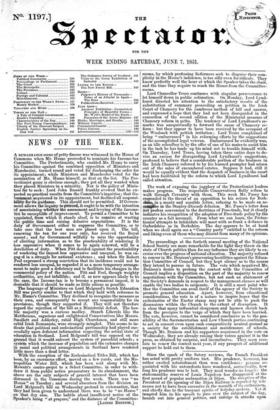NEWS OF THE WEEK.
za. REMARKABLE scene of petty finesse was witnessed in the -House of Commons when Mr. Hume proceeded to nominate his Income-tax Committee. The Protectionists, who enabled Mr. Hume to carry his Committee against the combined opposition of Ministers and Manchester, turned round and voted for discharging the order for its appointment; while Ministers and Manchester voted for the nomination of Mr. Hume himself, as first on the list. The Pro- tectienist game is obvious enough; they got all they wanted when they placed Ministers in-a minority. Nor is the policy of Minis- ters far to seek : Lord John Russell frankly avowed that he ex- pected no practical results from the Committee's inquiries ; that Go- vernment acquiesced in its apppointment, but declined all responsi- bility for its guidance. This should not be permitted. If Govern- ment allows the inquiry to proceed, it ought to be with the intention. of ascertaining whether the assessment and levying of the Income- tax_ be susceptible of improvement.. To permit .a Committee to be appointed, from which it stands aloof, is to connive at wasting the public time and raising delusii-e expectations. It is the duty of Government either to suppress the Committee, or to take care that the best men are placed upon it. The bill, renewing the tax for one year only, has received the Royal assent ; and for Government wilfully to miss the opportunity of eliciting information as to the practicability of rendering it less oppressive when it eomes to be again renewed, will be a dereliction of duty.. When Pitt decided against the practicability of rendering the impost less oppressive and unequal, he was en- gaged in a struggle for national existence ; and when Sir Robert Peel expressed a strong conviction that its incidence could not be rendered less unequal, he regarded it as a mere temporary arrange- ment to make good a deficiency and to facilitate his changes in the commercial policy of the nation. Pitt and Peel, though weighty authorities, are not infallible ; and if, as now appears likely to be the case, the Income-tax is to become a permanent impost, it is desirable that it should be made as little odious as possible.
The language of Ministers on Lord Melgund's Scotch Education Bill was pretty similar to that which they held with reference to Mr. Hume's Committee. They declined to recognize the measure as their own, and consequently to accept any responsibility for its provisions, though they supported it. They will not therefore regard the rejection of the bill as a Ministerial defeat. The hos- tile majority was a curious medley. Stanch Liberals like the Matthesons, sagacious and enlightened Conservatives like Messrs. Smollett and Adderley, rabid High Churchmen, and still more rabid Irish Romanists, were strangely mingled. This seems to in- dicate that political and ecclesiastical partisanship had played suc- cessfully.upon deficient information respecting the actual state of education in Scotland. Lord Melgund's bill was opposed on the ground that it would subvert the system of parochial schools ; a system which the increase of population and the extensive changes in social and political arrangements in Scotland have rendered little more than a dead letter.
With the exception of the Ecclesiastical Titles Bill, which has been, by an enormous effort, moved on a few yards, and the Me- tropolitan Water Bill, which has been sent along with Mr. Mowatt's contre-projet to a Select Committee, in order to with- draw it from public notice preparatory to its abandonment, the above are the only subjects of general interest that have been discussed in the Commons during the week. There was "no House" on Tuesday ; and several absentees from the division on Lord Melgund's bill on Wednesday pretend in extenuation, that they had been given to understand there was to be " no House " pn that day also. The babble about insufficient notice of the Speaker's being " at prayers," and the distance of the Committee- rooms, by which professing Reformers seek to disguise their com- plicity in the House's indolence, is too silly even for ridicule. They know perfectly well the hour at which the Speaker takes the chair, and the time they require to reach the House from the Committee- rooms.
Lord Chancellor Truro continues with singular perseverance to let himself down in public estimation. On Monday, Lord Lynd- hurst directed his attention to the satisfactory results of the substitution of summary proceeding on petition in the Irish Court of Chancery for the cumbrous method of bill and answer, and expressed a hope that they had not been disregarded in the concoction of the second edition of the Ministerial measure of Chancery reform in petto. The tendency of Lord Lyndhurst's re- marks was unequivocally to forward the cause of Chancery re"- form : but they appear to have been received by the occupant of the Woolsack with pettish irritation ; Lord Truro complained of being " embarrassed" in his reforming efforts by the suggestions of the accomplished legal veteran. Embarrassed he evidently was as an idle schoolboy is by the offer of one of his mates to assist hill; in the task he has made up his mind not to trouble himself with On Thursday, Lord Truro, having taken three entire days to de- vise an excuse for disregarding Lord Lyndhurst's suggestions, professed to believe that a considerable portion of the business in the Irish Chancery referred to by his learned prompter had arisen out of the sales of encumbered estates. Suppose it had, still it would be equally evident that the despatch of business in the court had been facilitated by the reform -to which Lord Lyndhurst had called attention.


























